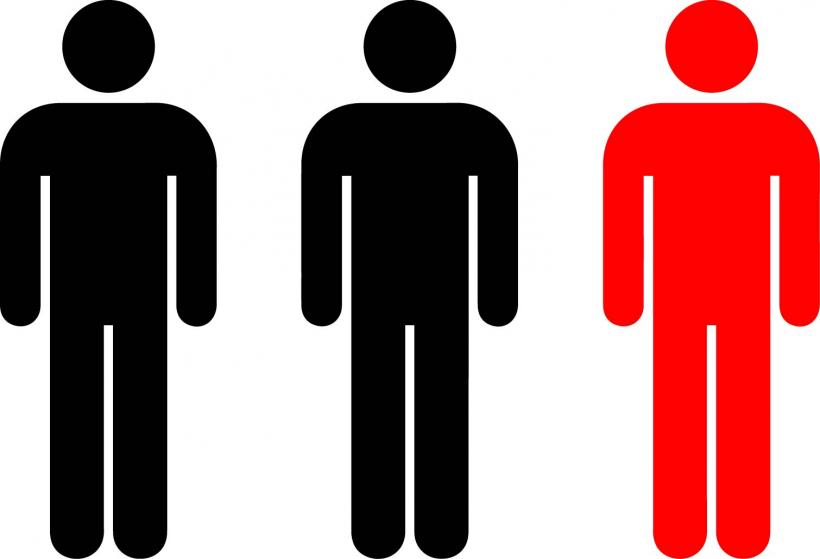
For days now I've seen a swirl of headlines and web comments proffering various manifestations of this: "Shocking new study shows one-third of men would commit rape!" It's scrolled down my Twitter timeline, it's needled its way into my news channels, it's been posted on friends' Facebook walls. And indeed, there is a fresh survey out of North Dakota: Denying Rape but Endorsing Forceful Intercourse: Exploring Differences Among Responders that has been getting a bit of play in the media cycle.
And it did in fact find that one-third of dudes in college would rape if they knew they could get away with it.
The survey was obviously rather limited in its findings as it analyzed only 73 men—more than 90% of whom were white—all from the same university. But the findings were clear: 31.7% of participants said they would act on “intentions to force a woman to sexual intercourse” if they knew they could get away with it. Forcing a woman to have sex is, of course, rape. There was, however, a disturbing discrepancy when participants were asked whether they would act on "intentions to rape a woman" if, again, they were assured to be able to get away with it. In this case, "only" (as many articles distressingly phrase it—only!?) 13.6% agreed with the statement.
The research team also discovered that—shocker!—men who were comfortable admitting their intentions to rape displayed openly hostile attitudes toward women. And even the guys who would "only" force sex on a woman were linked with "callous sexual attitudes"—i.e., of the Neanderthalic variety (sorry Neanderthals), that holds women as objects and men as aggressors. Per the researchers:
“Given that callous sexual attitudes permit violence and consider women as passive sexual objects, it follows that for men who endorse these, sexual aggression becomes an appropriate and accepted expression of masculinity. In this sense, using force to obtain intercourse does not become an act of rape, but rather an expression of hyper-masculinity, which may be thought of as a desirable disposition in certain subcultures.”
But is all of this, as headlines and tweets and cries from the peanut gallery contend actually "shocking" . . .?
I fully acknowledge that we live in a click-bait-driven world, and maybe (sadly) we need descriptors like "shocking" to score those page views, to drive the message home and yet . . . are these findings really that "surprising"?
Absolutely not. At least not for those of us well-versed in the pervasiveness of rape culture and the anti-rape movement.
This is not to say these data are not disconcerting. Clearly they are. But they aren't, by any means, unprecedented.
In the 1980s, UCLA psychologist Neil Malamuth surveyed men’s attitudes toward sexual violence and found that 50% of men would force sex on a woman if they thought they could get away with it. There was a similar discrepancy between the men who admitted they would force sex and those who would "rape" if they could get away with it, which, again, was a "mere" 15%. (From an international perspective, a 2013 sweeping survey of over 10,000 men from six countries conducted by the UN found that most men who raped simply believed they had the right to take control of women's bodies.)
Here we are in 2015 with so much change beneath our belt . . . but these numbers belie our feelings of progress.
While I acknowledge, am grateful for, and celebrate every damn bit of the brave, tireless work anti-rape activists have done over the years—society has made great strides against sexual violence and how we frame and combat it—but studies like this one only translate into data points the double standard of our old, pernicious gender scripts. "Nice" or "good" girls don't say yes and "real, masculine" men don't listen to no—notions that, largely, continue to thrive.
Take another recent survey of teenage girls, which showed that they believe sexual coercion—and even violence—is normal. Born with the foundational notion of men's inability to control their sex drives—harassment and coercion, they believe, is just part of the female landscape.
The issue is a deeply ingrained ignorance of what constitutes sexual violence, of what it looks like. Rape is sex without consent, but we haven't learned this yet. Not really. The term still widely conjuring up the tired, extraordinarily rare image of a stranger in a park, wielding a knife and skulking through the night.
And we still very much struggle with consent. A quick look to the media uproar over California's "yes means yes" law—which doesn't even pertain to the criminal justice system—confirms this. Personally, I wonder if I'd even be aware of the notion of consent were it not for my own liberal college education. Hailing from rural, small town America, where you were a slut for having sex—full stop—it wasn't until I was on the sunny grounds of my progressive college that I'd even heard phrases like "enthusiastic consent." What does that even mean, I remember wondering. It sounded great, but odd. Foreign. If you lead a guy on, you have to satisfy him, but then you're a slut, was the damaged cyclical mindset that had been ingrained in me—that our society ingrains in so many women across the nation.
I can't know, of course, because it's a "path not traveled," whether notions of consent would have trickled into my consciousness over the past few years had I remained in my hometown instead of becoming ensconced in more progressive circles. Would the idea of consent, a deep knowing that I don't have to do this—any of this—unless I'm super into it, have sunk into my consciousness had I remained in my rural town?
I'm skeptical. And it's the conversations with the guys from the schools that were having active conversations about consent that have me deflated. Guy friends whom I treasure, who listen, who care . . . but who, wrapped up all snug in their man-world, have the ability to remain largely ignorant about the realities of sexual violence. "I know it's hard for women to report rape, but I don't understand why," a friend told me recently. His total ignorance would almost be sweet (OK, actually not, never), were there not an ocean of shame, PTSD, anxiety, and violence, separating the world of survivors and the many men who walk around totally unaware of it all.
Combating this societal scourge begins with an acknowledgement of the devastating depth and breadth of the issue—and it continues with education about consent. We need an entire paradigm shift to confront a world in which one-third of dudes participating in a survey in North Dakota sign off on rape—without even realizing it.
Maybe I should accept that the publishing of this survey and its garnering media attention at all is marks tremendous progress, that it means even more sweeping, consequential change is, perhaps, just around the river-bend. After all, change happens slowly over time, in itty-bitty increments, I know this. Then again, it's hard to feel all rosy when this is where we are as a society. Most of all I really, really wish fewer people were—or need to be—"shocked" by the prevalence and normalization of sexual violence in our culture.






